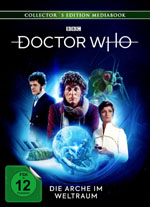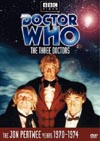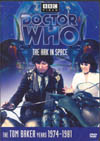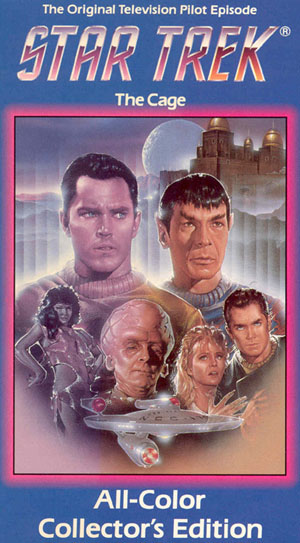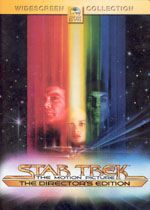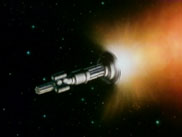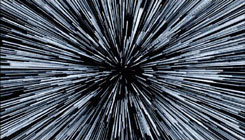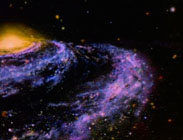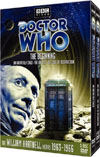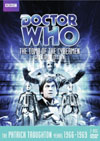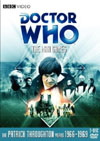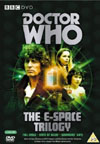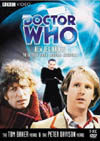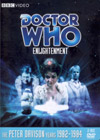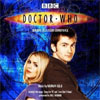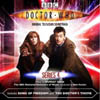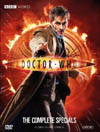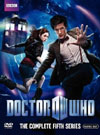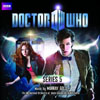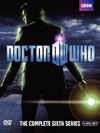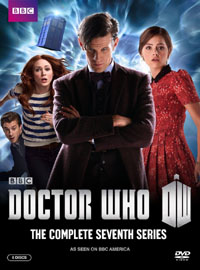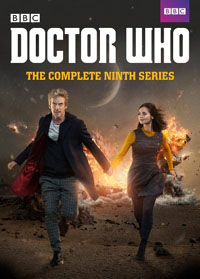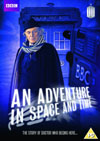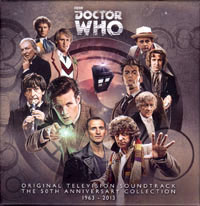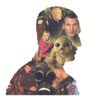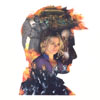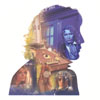Doctor Who Episode Guide Catalogues:
Looking for a good Doctor Who
episode guide? Want to browse through
the entire DVD line at the same time?
Want to know who did the music and where
it is available? Our
"Episode Guide Catalogues"
are for you:
William Hartnell Era
1963-1966, BW
Patrick Troughton Era
1966-1969, BW
Jon Pertwee Era
1970-1974, Colour
Tom Baker Era
1974-1981, Colour
Peter Davison Era
1981-1984, Colour
Colin Baker Era
1984-1986, Colour
Sylvester McCoy Era
1987-1989, Colour
Christopher Eccleston Era
2005, Colour
David Tennant Era
2005-2009, Colour
Matt Smith Era
2010-2013, Colour
Peter Capaldi Era
2014....
Jetzt auch auf deutsch:
Erster Doktor
1963-1966, schwarzweiss
Zweiter Doktor
1966-1969, schwarzweiss
Dritter Doktor
1970-1974, farbig
Vierter Doktor
1974-1981, farbig
Fünfter Doktor
1981-1984, farbig
Sechster Doktor
1984-1986, farbig
Siebter Doktor
1987-1989, farbig
Other Lyratek.com Pages:
-Home Page
-Site Map
-Contact Page

Science Fiction
reviews, guides, & catalogues:
-Doctor Who
-Sliders
-Star Trek
-Stargate
-The Matrix

Astronomy
reviews, guides, & catalogues:
-The Universe
-Cosmos
-How the Universe Works

Articles:
-The Fourth Density
-The Maldek Files
-Recipe for Health
-Political Evolution
-Animal Whispering
-E=mc2 Page
-Philadelphia Experiment
-Green Control
-Monetary Reform

Resources:
-Dr. Deepak Chopra
-Dr. Stephen Covey
-Dr. Bruce Lipton
-Powertalk Interviews
-Flax Oil Secrets
-The Future of Food
-Archive Page
-What the Bleep Do We Know at Lyratek.com?
-Space Adventures Music Releases
-Classic Music CD Guide & Catalogue


|
|
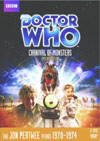
|
"Holmes gets the dynamic spot on: Kalik will secretly create havoc and destruction,
panic and fear, while planning to publicly show up as a hero with a solution and
earn the favour of all the common citizens. It still amazes me
how many people watch so many films that illustrate this,
and still fall for the politician's magic trick when it happens in real life.
Anytime a political figure gains ground from combating a horrible disaster or tragedy,
it is worth wondering if he or she didn't have an intentional,
plausibly deniable hand in setting the whole disaster up in the first place."
Review of "Doctor Who: Carnival of Monsters"
|
|
|
|
Doctor Who growth explodes in Germany!
The Germans suddenly seem keen to produce
German-language audio tracks for the entire range
of classical episodes and put them on DVD & Blu-ray,
with as many bonus features from the English discs as possible!
See what's available so far with our brand new German language
episode guide catalogue pages:
Vierte Doktor auf deutsch
|
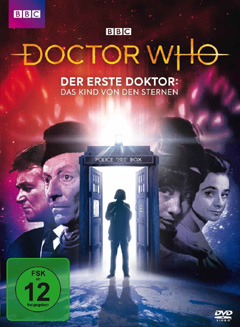
Erster Doktor auf deutsch
|
|
Settle back and read in-depth Reviews for each Doctor Who story:
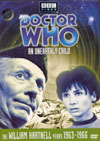
|
Remember, EVERY Doctor Who story from William Hartnell's original pilot
"An Unearthly Child" (story no. 1)
to
"The Husbands of River Song" (story no. 268)
concluding Peter Capaldi's second season
has an extensive, detailed review here on this site, and usually
one that aims to highlight the positive philosophical qualities written into the adventure
as well as its artistic merits.
Browse the entire line sequentially with our
episode guide catalogues,
to find the exact review you want to see,
or to find deals on whichever DVD's you still need for your collection....
|
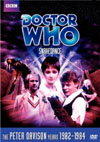
|
"A close study of this story reveals the thematic idea of fearful spectacle
being the Mara's chief mechanism for gaining control over its intended subjects.
This is in fact a reflection of how people are often steered off of a path of
spiritual enlightenment, when constant distraction is offered to them instead,
and fear-based ones often yield the most immediate results for little effort,
assuming of course that one's subjects are weak-minded enough to play along.
Just notice how often the [villain's] dialogue is about begging someone to
look at something, and how pathetic it becomes when such attention is finally refused."
"Uniquely, [the story's] mentor brings forth some actual solid emotional and
metaphysical information, expressed simply and helpfully. As such,
it has the potential to reach beyond the Doctor and this story,
to reach into viewers' lives consciously or unconsciously and have impact.
Even after dismissing this story in my youth,
I found Dojjen's lines coming back to me whenever I needed them most....
"Fear is the only poison."
"Ask your question."
"Steady your mind."
"Attach to nothing."
"Let go of your fear."
"The Stillpoint is within yourself, nowhere else."
"And along with his words and his voice, came returning images from the program,
of glowing blue crystals, of communion between mentor and hero,
of faces filled with calm, assertive, all-knowingness,
and of Peter Howell's brilliant new-age musical effects. Likely without realizing it,
Doctor Who audiences were given a working formula for meditation.
How many have yet tapped into its power to heal, to focus, to overcome fears,
to become more brilliant?"
Review of "Doctor Who: Snakedance"
|
|
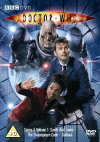
|
"This hymn, neatly embedded in the heart of a science-fiction dystopia,
successfully paints a picture....
proclaiming an embrace of and love for ritualistic suffering, while the last line,
the final exchange of old ways for something brighter and more appropriate,
is phrased as something to be procrastinated indefinitely.
How often is this aspect of Christianity not only accepted
but celebrated by members of our society?
And how often do we repeatedly head into the predictable traffic jams
on our main city highways, while neglecting to even seek out and learn
alternate routes through lesser known streets? Human nature isn't as
far flung from the portrayed habits of New New Yorkers
as we detached viewers may wish to think."
"Driving the point home more clearly....
the Doctor launches off on his own tangent,
not just thinking but acting outside the box, literally.
It's as if the hymn has spurred him to realize that
the time to exchange the cross for the crown is long overdue,
and he wastes no time."
Review of "Doctor Who: Gridlock"
|
|
|
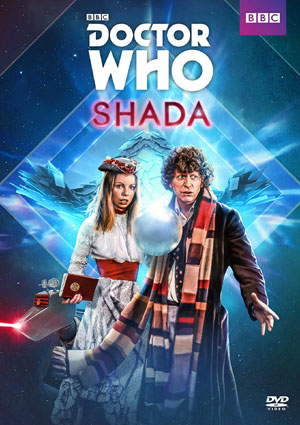 |
|
New animation and voiceovers finally make "Shada" into
a glorious success as a completed narrative.
But the new DVD isn't quite the slam-dunk
it so easily could have been.
A MASSIVE new update to
our review pages
digs into the details and reveals all....
|
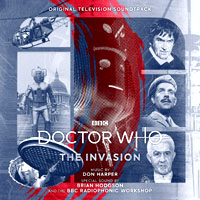
Doctor Who
The Invasion (1969)
Original music soundtrack.
composed
by Don Harper
Audio CD
Total Time: 63:02
NEW for 2018 September
|
All Tracks by Don Harper
except as noted.
Track Listing:
1. Doctor Who (1967, Ron Grainer / Delia Derbyshire) (0:55)
2. The Dark Side of the Moon (Music 2 Variation) (0:35)
3. The Company (Music 7) (1:33)
4. Hiding (Music 8) (4:56)
5. International Electromatics Headquarters (Music 3) (0:18)
6. Muzak (*composed by John Baker) (2:48)
7. The Cyber Director (Music 5) (0:11)
8. The Cybermen, My Allies (Music 7) (0:29)
9. Brigadier Lethbridge-Stewart (Music 12a) (1:25)
10. Plans for Invasion (Music 8) (1:28)
11. Mysteries (Music 12) (1:33)
12. Fire Escape (Music 11) (1:14)
13. The Dark Side of the Moon (Reprise) (Music 2) (0:34)
14. The Cybermen, My Allies (Reprise) (Music 7, looped) (1:09)
15. Music 4 (Trapped in Gas Chamber - v. 1 & 2) (1:32)
16. Music 9 (Photo Gallery Jazz Session) (2:23)
17. Music 10 (2:02)
18. Music 13 (Photo Gallery Credits) (0:08)
19. Music 14 (Photo Gallery Blast-hopping) (0:17)
20. Music 15a (0:06)
21. Music 15b (IE Shock Sting) (0:23)
22. Music 15c (IE Shock Sting short) (0:06)
23. Music 15d (0:22)
24. Music 15e (0:19)
25. Music 15f (0:06)
26. Music 15g (0:07)
27. Music 15h (0:26)
28. Music 16a (0:07)
29. Music 16b (0:08)
30. Music 16c (0:09)
31. Music 16d (0:09)
32. Music 16e (0:07)
33. Music 16f (0:10)
34. Music 16g (0:10)
35. Part of TARDIS disappears (*Brian Hodgson) (0:27)
36. All of TARDIS disappears (*Brian Hodgson) (0:27)
37. TARDIS take off slow and painful (*Brian Hodgson) (2:16)
38. IE Headquarters Exterior (*Brian Hodgson) (10:35)
39. IE Headquarters Interior (*Brian Hodgson) (6:28)
40. Computer (*Brian Hodgson) (0:24)
41. Cyber Director Appears (*Brian Hodgson) (1:03)
42. Cyber Director Constant (*Brian Hodgson) (2:39)
43. Cyberman Brought To Life (*Brian Hodgson) (2:29)
44. Cyber Invasion (*Brian Hodgson) (7:51)
|
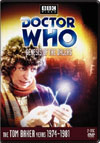
|
"Beginning with Ronson, the Doctor is very
forthcoming and truthful about his origins, his opinions, his reasoning, and
his intentions - practically the opposite of many a David Whitaker script.
Also, just when you might think he'll be stuck wrestling fake clams in the cave
for most of an episode to formulaically pad the scripts, no,
he instead convinces reasonable people and antagonistics over to his side
with a refreshing swiftness and believability, practically the opposite of
the endless philosophical head-butting of the typical Malcolm Hulke script.
Now the story proceeds from this more interesting place...
Review of
"Doctor Who: Genesis of the Daleks"
|
|
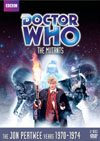
|
"This story also has the best alien planet setting in the entire Jon Pertwee era,
where writing balances scientific ideas with the creation of a unique culture
and mythology worthy of six episodes of exploration, and all this is quite effectively
and atmospherically realized within the limited resources of 1970's television.
Solos is an awesome planet! It is additionally interesting for those comparing this
to new millennium Doctor Who, to see how the script frames the Marshal's later
suggestion to rename the planet "New Earth".
This is clearly an insult to the Solosians, their culture, and
their claim to their own planet, a suggestion whose plans the Doctor must foil.
Solos is unique. It deserves to hold its own title."
"But speaking of the philosophies behind the actions of the characters,
it must be noted that of all the stories of season nine,
"The Mutants" presents the Doctor's character at its best.
Unlike in the previous story,
the Doctor wastes no time making unfulfilled promises of peace
while acting in a manner completely opposite to his stated philosophy.
Here in "The Mutants" he is simply seen to collect new friends and allies in his wake
as he goes along, until local former enemies find themselves working together and
helping each other. This is an interesting contrast to the main antagonist of the piece,
who is doing the opposite and setting former friends and allies
at each other's throats for his own personal gain. And the Doctor is also seen
to tackle a wide variety of problems and come out victorious,
something the next story has great difficulty in arranging."
Review of "Doctor Who: The Mutants"
|
|
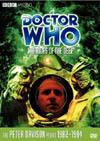
|
Trying to point out the idiocy of retaliatory annihilation to the powers that be
is in essence just arguing with their cover story -
they never really believed in it either. Now that virtually no member of the public
at large can be fooled into investing in it (and voting for it) any longer,
they've moved on to new cover stories."
"But a more insidious pattern ... begins to blossom here, and
that is the proliferation of passive-aggressive syndrome, where
characters quietly and passively bottle up all the things that are bothering them,
until an explosion of hostility erupts later on causing them to
burn their bridges with other people, or worse."
Review of
"Doctor Who: Warriors of the Deep"
|
|
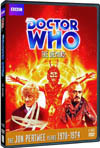
|
"Episode Five begins with truth triumphing over trickery,
much to the horror of our neighbourhood advocate of magic.
It's a good thing in the longer run though,
as magic and science have stopped fighting long enough
to listen to each other and find common ground here.
"Science then proves effective, but only in a very limited way...
Time to get technology out of the way and focus on inner qualities.... "
"For years I found the ending to be quite a let-down,
until I freed myself from accepting the explanations offered by the characters
in the story. In other words, don't judge a territory by its map.....
Judge the mapmaker by the map instead, and check out the territory on your own!"
Review of "Doctor Who: The Daemons"
|
|

|
"David Daker's portrayal of Rigg's [change] in particular is
one of the most dramatic elements of the entire season.
The script is full of plot twists and fantastical science fiction ideas,
and the pace never lets up for a moment. The characters are
very well motivated as written, thus even those portrayed with
a mediocre acting performance still seem real.
The Doctor is kept quite busy investigating and solving problems all throughout
the story, and he comes up with some very creative solutions in the end.
As in his previous scripts with Dave Martin,
Bob Baker gets the Doctor's character perfect, filling his screen time
with everything that I want to see him do, and nothing that I don't."
Review of
"Doctor Who: Nightmare of Eden"
|
|
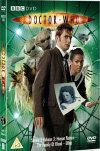
|
"Joan asks a very poignant question of the Doctor at the end of the story,
and the Doctor keeps silent and has to walk away.
I think the story might be better off as a whole
if the Doctor could offer some kind of response to that question -
perhaps not to Joan in that moment, or perhaps something
apologetic rather than in defense of the strategy that Joan has so expertly shot down.
The Doctor can make mistakes like anyone, and
his character is better off by showing he can learn from them.
By not answering Joan's question for the audience, it seems
he still thinks he was right, and it's pretty hard to see how that was the case
based on the information we have."
"...an unhealthily strong pre-occupation with martyrdom.
On one hand, there is enough evidence throughout the story to indicate that
its makers believe that war, and the First World War in particular,
was a senseless waste - a poor strategy that
world leaders pushed their populations into.
Whatever the strategic faults of the scarecrow shoot-up scene might have been,
it still earns thematic points in that regard. Yet on the other hand,
this story's makers seem to want to celebrate the sacrifices made in that war,
diluting their anti-war sentiment with not just one but THREE major Tim Latimer scenes
packed together at the end of the story, until the ending has you scratching your head
wondering why they suddenly changed direction at the last minute,
or what it was that they really wanted to say all along."
Review of
"Doctor Who: Human Nature"
|
|
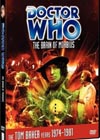
|
"Should Doctor Who not aim for something greater than fear?
...Fear is not high on my list of sought-after emotions.
..."The Brain of Morbius" really has little else going for it
to make it interesting for the larger audience who tune in to Doctor Who
for a wider variety of reasons. This one is for the horror fans only."
"...All the really interesting events have taken place before the story opens.
Once the Doctor arrives, what does he really get to do? He never seems to
take the threats seriously enough to form a solid plan of action to foil them,
nor is he seen to act as an investigator. Rather he gets passed back and forth
between the sisterhood and Solon's clutches in some of the most poorly motivated and
illogical capture and escape shuffles in the show's entire history."
Review of
"Doctor Who: The Brain of Morbius"
|
|
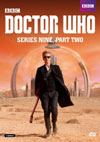
|
Doctor Who In-depth Reviews:
"Face the Raven",
"Heaven Sent", and
"Hell Bent".
Big mistakes are put on display
as good fresh story ideas become scarce...
Though the writers work hard to keep the episodes
decent and interesting, it's an uphill struggle
as the all-too-familiar cry of "wolf" devours
the remaining long-term arcs...
|
|
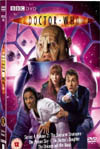
|
"The whodunit mystery has no real space to breathe.
The questions barely register with the audience before a big scene pours out
all the answers and revelations on top of us. No room for escalations, red herrings,
clues and paths that twist towards the truth, then away, then back again.
As with
`The End of the World' (story no. 162) for "whodunit" reasons,
and half-a-dozen other stories this decade for other reasons,
the story is simply too short to be powerful or have its true intended impact.
Leaving us with questions for a week while waiting for subsequent answers,
while we try to figure out the answers ourselves, is a sorely missing opportunity.
I still remember studying Part One of
`Frontios' (story no. 133)
before the following episodes were broadcast, and predicting that
the lighting device that Turlough shakes would become important to resolving the plot.
We should have time & opportunity to wonder likewise
about the box of intricate tools found in the bushes in this story,
yet we rocket through the whole thing so disappointingly quickly.
Ultimately, for those looking for a good Agatha-Christie-style mystery
brought into the Doctor Who sci-fi arena,
`The Robots of Death' (story no. 90) will probably satisfy more."
Review of
"Doctor Who: The Unicorn and the Wasp"
|
|
|
How well do modern scientists really know their Einstein?
How many of the popular oft-recited mantras
actually CONTRADICT his theories?
|
|
|
Doctor Who Episode Guide Catalogues:
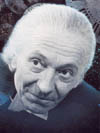
William Hartnell Era
1963-1966, BW
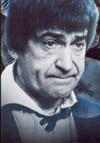
Patrick Troughton Era
1966-1969, BW

Jon Pertwee Era
1970-1974, Colour

Tom Baker Era
1975-1981, Colour
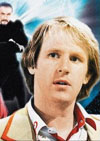
Peter Davison Era
1981-1984, Colour
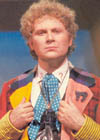
Colin Baker Era
1984-1986, Colour
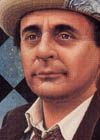
Sylvester McCoy Era
1987-1989, Colour
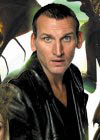
Christopher Eccleston Era
2005, Colour
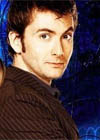
David Tennant Era
2005-2009, Colour

Matt Smith Era
2010-2013, Colour

Peter Capaldi Era
2014....
|
|
Understanding the Chronology and Mystery of Doctor Who:
The main character is simply called "The Doctor". We never find
out his real name, and a lot of his personal background remains a mystery
as well. We do find out in the first episode that he is from another planet,
and later on that he has two hearts and is a lot older than he looks.
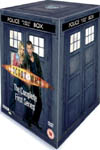
|
He owns an unusual vehicle called the TARDIS, which can materialize
anywhere in time and space, even underground or inside another ship.
On the outside, the TARDIS looks like an old blue police telephone booth,
but this is just a computer generated object that serves as the entrance
to the rest of the ship.
|
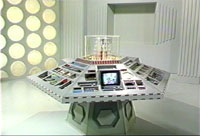
|
The interior is a big maze of rooms and corridors that exists in
another dimension. Most of the walls are white with lots of round yellow
panels inside, but not too many Doctor Who stories will show more than
just the "Console Room", where the Doctor operates the ship from a six-sided
control console that sits in the center of the room. He often has trouble
getting the TARDIS to go where he wants it to - in the early years, he seems
to have no control over it at all! But he does get much better at it later
on....
|
The Doctor usually travels with one or more friends, most of whom are
from Earth, most of whom are female. Wherever they go, they usually end up
involved in some kind of adventure, and the Doctor is usually the hero by
the end of it.
They explore and discover other cultures as they go, they find mysteries
that need solving, and they battle alien invaders and corrupt individuals.
The Doctor is highly curious, skilled in almost every field of science,
and quite technically clever. He stands up for his social beliefs, even
if it means defying authority. He is also a humorous and eccentric
character. He likes to dress as an English gentleman, but often from the
wrong time period, so he often stands out.
Long Live the Cliffhanger
A typical Doctor Who story is a movie-length adventure, but broken up
into four or six episodes, each around 25 minutes long, each ending in a
cliffhanger that makes you desperate to see the next episode. The BBC began
to make Doctor Who in 1963, and the first episode went out on November 23,
the day after U.S. president John F. Kennedy was assassinated. It
was made in black and white, and
the Doctor was played by William Hartnell as an
eccentric old man with white hair. He sets off from
London, 1963 with his "teenage" granddaughter Susan, and two teachers from
the school she had been attending for the last five months.
DVD NTSC
Region 1 U.S.
Beginning Box Set
 2013 2013

|
DVD NTSC
Region 1 Canada
Beginning Box Set
 2013 2013

|
DVD PAL
Region 2 U.K.
Beginning Box Set


|
New 2013 North American re-issue contains identical content to
the original 2006 issue (pictured at right).
|
plus a bonus
30-minute recreation of
the lost story no. 4:
"Marco Polo"
(originally 7 episodes).
Practically the first half of
Season 1 is covered by this set.
Read about DVD extras here...
Stories: Teachers Ian Chesterton and Barbara Wright
decide to investigate reports that highschool student
Susan Foreman lives with her grandfather, a Doctor,
inside a police box in a junkyard. The quartet soon find
themselves amongst a primitive tribe
100 000 years in the
past, and not long after in a petrified forest on a
post-apocalyptic alien planet. Is the nearby city
as deserted and lifeless as it appears? Or will the
Doctor and his new friends be taking an alien presence
with them when they leave?
|

William Hartnell Era
1963-1966, BW
|
The adventures
alternate between futuristic stories on other planets, and historical stories
from Earth's past, and are typically aimed at a family audience. A big part
of the show's early success was the Daleks, a hostile race of mutants that
stay hidden inside gliding robotic travel machines. The Daleks appeared
many times in the show. After a little more than a year, Susan became
attached to a young man in London in 2164, and her character left the show.
Over the years, many other traveling companions came and went.
|
|
After three years, William Hartnell also left the show. At this point,
the Doctor did something normal for his species - he "regenerated". His
body suddenly became younger.... he looked middle-aged now, his hair was
black, and his personality and mannerisms changed a bit.
Patrick Troughton
had taken over the role, and is now known as the "Second Doctor".
He shared most of his adventures with a young man from 1700's Scotland named
Jamie McCrimmon, and the two made a successful and humorous pair.
The second Doctor once gave his age as 450 years old. Many other enemy
monsters became popular during this time: the Cybermen, the Yeti, the
Ice Warriors.... But Troughton's last story began to
reveal some interesting things about where the Doctor himself came from.....
|
Review: "The Tomb of the Cybermen".
One of the greatest classics of
the black-and-white era doubles
as a marvelous introduction to
Patrick Troughton's Doctor and
his most persistent foes.
|
|
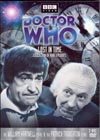
|
Approximately 1/3 of the black and white episodes of
the first two Doctors are missing, since the BBC wasn't careful enough
to keep copies. Although most stories from seasons one, two, and six
are complete, it is rare to find a complete original story from
seasons three, four, or five.
Quite often a person can only see one episode from
a four or six episode story these days. But, thanks to the fans,
recordings of the sound of all the episodes still exist,
and recreations using animation or montages of photos and rare clips
seem poised to fill in all remaining gaps one day.
|
|
In 1970, Doctor Who changed. It was made in colour.
The Doctor was played by Jon Pertwee,
who was tall and white-haired. He was exiled to
present-day Earth, and he became the scientific advisor to a secret military
organization called U.N.I.T., or United Nations Intelligence Taskforce, led
by Brigadier Alastair Gordon Lethbridge-Stewart, or just "Brigadier" for
short. The Doctor and UNIT spent many adventures battling alien invaders
and other menaces to mankind. The third Doctor loved gadgets and fast cars,
but kept hard at work repairing the TARDIS to escape Earth. But even after
he had regained his freedom, the Doctor continued to return to his friends
at UNIT often.
Made under producer Barry Letts and script editor Terrance Dicks during
this era,
the scripts became more mature, and tackled some interesting
social themes. An arch villain was also created: He called himself
the Master and came from the same planet as the Doctor. He had his own
TARDIS, and like most other TARDISes that worked properly, the exterior
entrance could disguise itself to look like anything. In
later years, the interior of the Master's TARDIS was done in black.
All Doctor Who episodes from this time and beyond still exist,
although a handful of Jon Pertwee's (which should all be in colour)
can only be found in black and white. Many recolourization techniques
have proved fruitful so far, and it appears that all Pertwee episodes
will be in colour when they make it to DVD.....
|


Review: "Spearhead
From Space"
now on Blu-ray.
The exile on Earth begins!
U.N.I.T. and its new scientific
advisor face the very first wave
of the Auton invasion.
|
|
|
|
Tom Baker played the fourth Doctor,
and is probably the most popular
Doctor of all, especially in North America. Tall, with brown curly hair,
he is known for wearing a very long scarf of many colours, and giving out
candies called "jelly-babies".
Several times he quoted his age as 749 or 750. He was in the role for
7 years. During his first few years under producer Philip Hinchcliffe
and script editor Robert Holmes, the stories leaned towards horror,
and a lot of focus was put on making the acting and directing as good as
possible. It was only during this time that the Doctor gradually broke
his ties with UNIT.
Later on, as producer Graham Williams took over,
the sci-fi ideas gradually got better, and the stories more humorous
and brighter, although this era of the show is criticised by some as not
taking itself seriously enough. I started watching Doctor Who with
season 16, in which he searches the universe for the six disguised
pieces of
"The Key to Time".
I thought these stories were really good;
they hooked me, and bring back more nostalgia for me than any others.
|
DVD NTSC
Region 1 U.S.


|
DVD NTSC
Region 1 Canada


|
DVD PAL
Region 2 U.K.


|
This set contains
loads of extras,
including Tom Baker commentary on EVERY episode
and many behind the scenes featurettes.
So far, season 16 is the earliest Doctor Who
to be offered on DVD in a FULL SEASON box set.
|
Story nos. 98-103:
Season 16 Box Set:
"The Key to Time"
starring Tom Baker
26 episodes @ 25 minutes
Status: Complete
|
|

|
Overview: The White Guardian recruits the Doctor, K9,
and an inexperienced academy graduate named Romana
to reassemble the six disguised segments of the
Key to Time, beginning an odyssey of adventure and
sci-fi mystery across a variety of planets.
Ultimately, the Doctor
knows he will have to face and outwit the dark
forces that also seek the Key to Time, and learn
the secrets of the Key itself before the final
segment is revealed....
Contains six stories, also sold separately
in North America. For further details,
click on:
"The Key to Time", or read full
reviews listing DVD extras beginning with
"The Ribos Operation" (story no. 98).
|
In 1980, new producer John Nathan-Turner made Tom Baker's last year as the Doctor
(season 18) very respectable, and gave the show a lot of new energy
and marketability. Most of that year, including its best stories,
are available on DVD in 2 trilogy box sets:
DVD NTSC
E-Space Trilogy
Region 1 U.S.


|
DVD NTSC
E-Space Trilogy
Region 1 Canada


|
DVD PAL
E-Space Trilogy
Region 2 U.K.


|
|
Story: After dropping through a freak hole
in space, the Doctor, Romana, and K9 find themselves
in a pocket universe known as E-space.
Aided by Adric whose gang of rebelious teenagers
sense lies in the old legends, the Doctor soon uncovers
a trail of secrets about the inhabitants of the
marsh-planet Alzarius, investigates the deadly truth behind
the vampire lore of his own planet in a decaying medieval culture,
and stumbles into a mysterious gateway that could either be the
way out, or trap them until the end of time....
|
DVD NTSC
Region 1 U.S.


|
DVD NTSC
Region 1 Canada


|
DVD PAL
Region 2 U.K.


|
|
Story: Transformation is in the cards for the
Doctor, his crew, and one of his arch-enemies in this
trilogy of classic stories from the early 1980's.
Witness the end of
Tom Baker's unmatched 7 year era
as the Doctor, and the New Beginnings that
the show embarked upon....
Also available separately in North America.
|
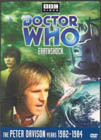
Review: "Earthshock"
The fifth Doctor's
classic battle with this deadly
foe is
easily the showstopper of season 19...
|
|
The fifth Doctor, Peter Davison,
is my personal favourite. He is tall,
blond, and appears to be in his late twenties or early thirties. Although
very physically agile, he plays it as though there is something much older
and wiser within him, and he's probably the most polite and agreeable of all
the Doctors. I think it's a shame that he only stayed in the role for three years.
|
Colin Baker and
Sylvester McCoy also took their turns as the Doctor
before the BBC stopped making the show in 1989. They had completed 26
seasons in all, totaling around 160 movie-length stories, and bringing the
Doctor past the ripe old age of 953.
In addition, two colour feature films
had been made in the sixties, both starring
Peter Cushing as the Doctor,
battling the Daleks.
A new TV movie
was made in 1995/96 in which
Paul McGann took over as the eighth Doctor, but this wasn't particularly
popular and didn't lead to anything new.
Finally in 2005 the BBC started to make the show again.
Christopher Eccleston played the ninth Doctor
throughout the 2005 season, beginning the show's modern resurrection.
|
|
Story nos. 161-170:
The Season 27 box set
(2005)
starring Christopher Eccleston
Also known as "Series One"
13 episodes @ 45 minutes.
Reviews begin with
"Rose".
Status: Complete
|
|

|
Stories: Teenage department store clerk
Rose Tyler encounters the ninth Doctor, who
whisks her into an odyssey of adventures
through time, meeting and battling various
alien species. But this Doctor harbours
some dark secrets from his recent past,
which are about to catch up with him,
and Rose has no idea how deeply she is
involved....

|
|
The role quickly switched to
David Tennant, who took over as the tenth Doctor. He debuted in
"The Christmas Invasion" in December of 2005, and stars in the
2006, 2007, and 2008 seasons of Doctor Who, as well as
the 2009 "year of specials". Many of the modern show's
best stories took place in Tennant's debut season,
(season 28 for those who honour the entire chronology of this
giant among sci-fi franchises).
|
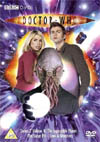
|
Review: "The Impossible Planet"
The David Tennant Era achieved
a crowning jewel in season 28 with this
creepy, philosophical tour-de-force
of exploration.
Find out how the new show
finally overcame its teething troubles
in our review....
|
|
|
By the time we got Matt Smith as the eleventh Doctor
starring in the 2010, 2011, and 2012-2013 seasons,
the heroic traveling Timelord was alive and well
and enjoying a whole new wave of popularity once again....
|
|
Story nos. 171-181:
The Season 28 box set (2006)
starring David Tennant
13 episodes @ 45 minutes
plus the 2005 special episode:
"The Christmas Invasion"
Status: Complete
|
|
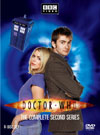
|
Story: The TARDIS stretches its range
farther than ever, as The Doctor & Rose,
joined by Mickey Smith, Sarah Jane Smith, & K9
battle a host of bizarre creatures and attempt
to discover the secrets of the universe.
Some secrets, however, turn out to be best
left alone....
|
|
|
Story nos. 182-192:
The Season 29 box set (2007)
starring David Tennant
13 episodes @ 45 minutes
plus the 2006 Christmas special:
"The Runaway Bride"
Status: Complete
|
|
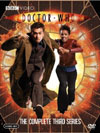
|
Story: Medical student Martha Jones thought
her life was complicated and hectic enough, until
the day she ran into the Doctor in her hospital
and suddenly found herself whisked off on an odyssey
through time and space, confronting alien creatures
and helping the Doctor uncover the secrets that will
keep him one step ahead of his arch-nemesis. But will
the Doctor ever really see her the way she wants him to?
|
|
|
Story nos. 193-203:
The Season 30 box set (2008)
starring David Tennant
13 episodes @ 45 minutes
plus the Christmas special:
"Voyage of the Damned"
Our reviews begin with the bonus prequel scene
"Time Crash".
Status: Complete
|
|
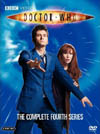
|
Story:
Catherine Tate's Donna Noble is back,
joining David Tennant's Doctor for 2008.
|
|
|
U.S.


NEW for
Sept. 24, 2013.
| Canada


NEW for
Sept. 24, 2013.
| U.K.


NEW for
Oct. 28, 2013.
|
Blu-ray U.S.


NEW for
Sept. 24, 2013.
| Blu-ray Canada


NEW for
Sept. 24, 2013.
| Blu-ray U.K.


NEW for
Oct. 28, 2013.
|
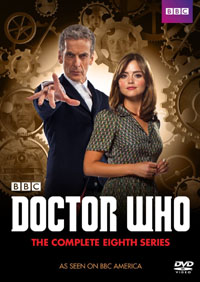
|
Peter Capaldi and Season 34 (2014)
The release date for this box set in the U.K. was
Monday, November 17, 2014.
Its North American debut was pushed back until
December 9, 2014.
The regular broadcast for the first episode
was August 23, 2014.
|
|
|
U.S.


NEW for
Dec. 9, 2014.
| Canada


NEW for
Dec. 9, 2014.
| U.K.


NEW for
Nov. 17, 2014.
|
Blu-ray U.S.


NEW for
Dec. 9, 2014.
| Blu-ray Canada


NEW for
Dec. 9, 2014.
| Blu-ray U.K.


NEW for
Nov. 17, 2014.
|
|
|
U.S.


NEW for
April 5, 2016.
| Canada


NEW for
April 5, 2016.
| U.K.


NEW for
March 7, 2016.
|
Blu-ray U.S.


NEW for
April 5, 2016.
| Blu-ray Canada


NEW for
April 5, 2016.
| Blu-ray U.K.


NEW for
March 7, 2016.
|
Top 5 Recommended products/stories for each Doctor:
The Best of William Hartnell - Complete stories:
Dabbling in audios of lost/incomplete stories? Check out:
(Not to be forgotten is the second Peter Cushing feature film
"Daleks' Invasion Earth 2150 A.D." - also highly recommended.)
The Best of Patrick Troughton - Complete stories:
|
Dabbling in audios of lost/incomplete stories? Check out:
|

|
The Best Jon Pertwee Stories I would recommend:
|
(mind you, nearly all Pertwee stories are good)
|

|
The Best Tom Baker Stories/Packages I would recommend:
|

|
The Best Peter Davison Stories I would recommend:
|

|
(Of course, you'll buy the New Beginnings Box Set as part of
Tom Baker's best, and get Davison's
Castrovalva
as a bonus.)
The Best Colin Baker Stories I would recommend:
The Best Sylvester McCoy Stories:
|

|
Getting more than one of these at once? It may be best
to watch them in chronological broadcast order...
although "Greatest Show" should perhaps be watched before
"Silver Nemesis" or
"Happiness Patrol" so character development
occurs more naturally.
The Best of David Tennant:
You will want this Doctor's adventures on the full season
DVD box sets with all the extras, meaning we only have four
items to choose from. Definitely go for
Season 28 first
(Series 2), as it has the largest number of strong stories.
Plus, it's Tennant's earliest set. If you like what you see,
continue in chronological sequence.
|

|
Paul McGann and
Christopher Eccleston
each have only one product worth getting -
in Eccleston's case, this will be the
full season box set.

|
Matt Smith has an ongoing mystery running through his era,
so it makes best sense to start with
his first year of stories and proceed in chronological order.
That said, the first half of
his second year features the best of his early
adventures.
|
Episode Guide Catalogues
of available Doctor Who DVD's, videos, & music releases,
chronologically listed
with extensive reviews in "In-Depth Analysis"
and "no-spoilers Buyers' Guide" formats

William Hartnell Era
1963-1966, BW |

Patrick Troughton Era
1966-1969, BW |

Jon Pertwee Era
1970-1974, Colour |

Tom Baker Era
1975-1981, Colour |

Peter Davison Era
1981-1984, Colour |

Colin Baker Era
1984-1986, Colour |

Sylvester McCoy Era
1987-1989, Colour |
|

Christopher Eccleston Era
2005, Colour |

David Tennant Era
2005-2009, Colour |

Matt Smith Era
2010-2013, Colour |

Peter Capaldi Era
2014....
|

More Popular Releases:
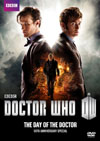
|
Doctor Who 50th Anniversary story:
"The Day of the Doctor"
starring Matt Smith, David Tennant, and others....
Status: Complete
-Read about DVD extras here
Region 1 NTSC DVD
release December 10, 2013.
Region 2 PAL DVD
release December 2, 2013.
|
|
Story: While facing the most crucial decision of the Time War
with the fate of his home planet Gallifrey in his hands,
the Doctor (John Hurt) is allowed to listen to his future selves (David Tennant, Matt Smith)
and witness the consequences of this decision on his life. Is he really free
to make any other choice, or is this future now cast in stone? Can the older Doctors
ever forgive their earlier self for what he did? How has Kate Stewart of U.N.I.T., 2013,
managed to get hold of a 3D painting of the event? And what connects all of this
to a Zygon infiltration of the court of Queen Elizabeth the first of England in 1562?
|
|
DVD NTSC
Region 1 U.S.


NEW for
Dec. 10, 2013.
|
DVD NTSC
Region 1 Canada


NEW for
Dec. 10, 2013.
|
DVD PAL
Region 2 U.K.


NEW for
Dec. 2, 2013.
|
Blu-ray U.S.
Region A/1


NEW for
Dec. 10, 2013.
|
Blu-ray Canada
Region A/1


NEW for
Dec. 10, 2013.
|
Blu-ray U.K.
Region B/2


NEW for
Dec. 2, 2013.
|
|
|

|
"The idea of two empires mistakenly blaming each other for the actions of
a calculating third party is actually a good intriguing idea,
capable of sustaining about an episode and a half single-handed...
It just doesn't work
if you stretch it out to five and a half episodes,
and have no other quality plot elements working along side it."
"By far the biggest design flaw in the writing of this story is that,
no matter where in the galaxy the story takes us,
it finds a jail cell from within which to tell itself."
Review of
"Doctor Who: Frontier in Space"
|
|

|
"The [DVD audio] commentary is enjoyable and charming... The highlight is
definitely Bernard Horsfall challenging one of Hinchcliffe's common assumptions
in part four, and putting him away a bit, amicably but firmly. Nice!"
Review of
"Doctor Who: The Deadly Assassin"
|
|
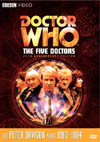
|
"....If decisions branch out into parallel universes and an unlimited field of outcomes,
and one travels through time regularly, one could easily meet versions (or "doubles")
of oneself that have had far different lives, and/or lengths of lives,
than what one remembers. Perhaps these are parallel Doctors, instead of,
or as well as, past ones."
"In addition to some earlier scenes where reportedly
`the mind of Rassilon is reaching out to attack us',
this story continues the good trend of emphasizing the power of the mind
that began in
`Time-Flight' (story no. 123) and
ran throughout each and every story of season twenty. Excellent."
Review of
"Doctor Who: The Five Doctors"
|
|
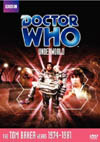
|
Flying Minyans Regenerate Best
"One interesting bit is the fact that at least some of the Minyans are capable
of biological regeneration like the Time Lords, and don't seem to be affected
by a thirteen-life limit. This staple process of the Doctor Who series is
demonstrated exceptionally well in this story, with Jackson narrating its background
and supporting the visuals of Tala undergoing the process. Dudley Simpson puts in
his most atmospheric piece of music for the story during this moment,
making it one of the best of the entire tale.
Regeneration is well-motivated here also, successfully combatting old age
and staving off death indefinitely."
Review of "Doctor Who: Underworld"
|
|

|
Regeneration vs. Reincarnation:
Why the similarities between the two
maybe really should end at a tasteful point,
as seemed obvious back at the first mention of the Corsair...
Read more...
Now if only it were Georgia Moffett's character of
The Doctor's Daughter Jenny borrowing the TARDIS....
|
|
New for February 26, 2015:

|
"The Universe"
This lively, informative, documentary series
featuring scientist interviews and very cool CGI graphics
has quickly become a favourite for astronomy enthusiasts.
Common topics include new discoveries of exoplanets,
features and conditions on planets and moons within our solar system,
and various principles of physics and biology with cosmic significance.
Data capsule summaries for individual episodes begin with:
"Secrets of the Sun"
|
|
New for March 13, 2015:
The new Astronomy section at Lyratek.com
expands with
eight new documentary data capsule reviews, beginning with:
"Alien Moons", plus:
"Cosmos" episode guide and music catalogue
This much-loved classic documentary series from Carl Sagan
continues to woo over new fans and
satisfy on repeat viewing those lucky enough to discover
it long ago. Now a new set of episodes with Neil deGrasse Tyson
continues the tradition....
|
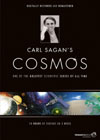
|
|
|























